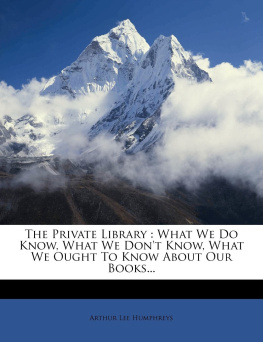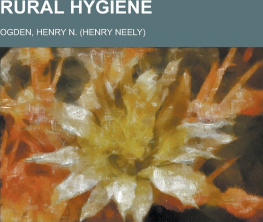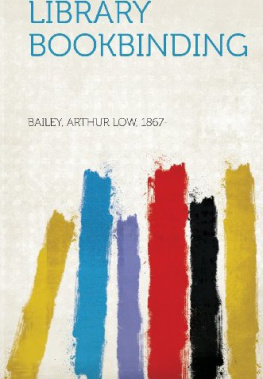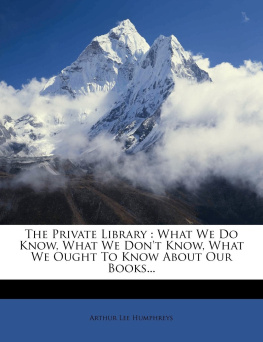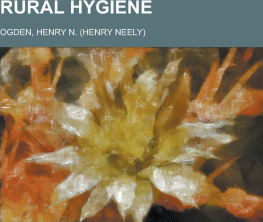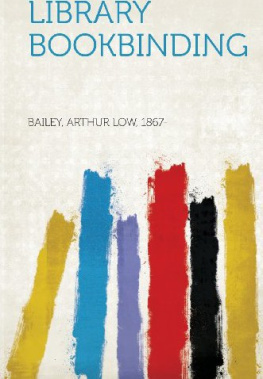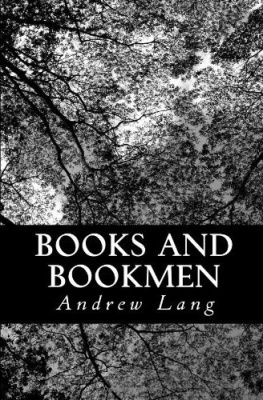The Project Gutenberg EBook of The Private Library, by Arthur L. Humphreys
This eBook is for the use of anyone anywhere at no cost and with
almost no restrictions whatsoever. You may copy it, give it away or
re-use it under the terms of the Project Gutenberg License included
with this eBook or online at www.gutenberg.org
Title: The Private Library
What We Do Know, What We Don't Know, What We Ought to Know
About Our Books
Author: Arthur L. Humphreys
Release Date: February 24, 2009 [EBook #28174]
[Last updated: March 17, 2011]
Language: English
*** START OF THIS PROJECT GUTENBERG EBOOK THE PRIVATE LIBRARY ***
Produced by Suzanne Lybarger and the Booksmiths at
http://www.eBookForge.net
THE
PRIVATE
LIBRARY
WHAT WE DO KNOW
WHAT WE DON'T KNOW
WHAT WE OUGHT TO KNOW
ABOUT OUR BOOKS
BY
ARTHUR L. HUMPHREYS
Fourth Edition.
LONDON: STRANGEWAYS & SONS
SOLD BY
HATCHARDS, 187 Piccadilly , W.
MDCCCC
PREFACE
WITH all the literature published on behalf of Free Librariesinstitutions which, after all, are of doubtful goodno one so far has written a book to assist in making The Private Library combine practical useful qualities with decorative effect.
For many years I have had opportunities of inspecting and reporting upon Collections of Books in numerous Country Houses, and I must say that the condition of books in the greater number of them is chaotic. A man will talk about all his possessionshis pictures, his objets d'art, his horses, his garden, and his bicycle, but rarely will he talk about his books; and if he does so, all his geese are swans, or just as often, all his swans are geese. There are servants in every house qualified to do everything except handle a book. There is no reason why the Library should not be just as much a place of amusement as the billiard-room, where the men are usually to be found. Books are much more amusing than billiards, and you may learn to play in jest or work in earnest with books just as you take to any other amusement. The whole truth is that at present books do not get a proper share of attention, and it is with the desire to remedy such a condition of things that I have printed this little volume, containing things that we do know, that we don't know, and that we ought to know about our books.
A. L. H.
187 Piccadilly , W.
CONTENTS
| PAGE |
| What is a Good Edition? |
| What is a Fine Copy? |
| Book Values |
| On the Care of Books |
| The Art of Reading |
| Common-place Books |
| Reference Books |
| Boudoir Libraries |
| Bookbinding |
| Book Hobbies |
| Old Country Libraries |
| Weeding Out |
| The Catalogue |
| Classification of Books |
| Bookcases |
| Miscellaneous Appliances |
| The Library Annexe |
| A Librarian |
| The Library Architecturally |
| Munificent Book-buying |
| The Medici and their Friends |
| The Dukes of Urbino |
| Pieresc |
| Mr. Ruskin's Advice |
| Index |
the
Private Library .
What is a Good Edition?
A good edition should be a complete edition, ungarbled and unabridged. If the author is a classic, the format of the copy chosen should in some way represent the style of the author. Gibbon, for instance, should be in large octavo or quarto, with print of a size to correspond. This is not always possible, for English editions of books often aim at mere cheapness, and of many great authors there exist no good editions. Thus there is no suitable edition of the classics printed in England, as there is and for long has been in France. A good edition is not necessarily an expensive edition, nor is it necessarily noble and generous in print and margin. The editions known as the 'Globe' editions of Pope and others are good editions because (1) They are complete; (2) Each one has been taken in hand and superintended by the most competent scholar and has notes sufficient but not pedantic; (3) Because they are well printed on paper of fair quality by printers who give wages liberally to careful press readers; (4) Because each work being a work of the first or classic order, it is bound in a simple and unaffected style, without meretricious gold or tawdry ornament. Now the 'Globe' editions are fitting in their place as types of right editions of the cheap kind. I will now take right editions of the more liberal and expensive kind. The 'Cambridge' Shakespeare, the last issue, each play in a separate volume, is right because (1) The print, paper, spacing, and simplicity of binding, are suited to the dignity of the work; (2) The edition has had brought to it fulness of knowledge and rightness of judgment; (3) Each volume is light to handle and easy to hold, and flexible in opening.
But it would be misleading to say that these are the only examples of right editions. In other books which I might name, excellent work has been brought to play which in the two types already named there was not scope for. I would like therefore to take another instance, and name the editions of Pope's Works, edited by Courthope and Elwin, of Walpole's Letters, edited by Peter Cunningham, and Boswell's Johnson, edited by Birkbeck Hill. These editions contain excellent and workmanlike features, such as good arrangement and good indexing, with notes and elucidations sufficiently ample. The size too of each volume is not extravagant as in certain ditions de luxe. Now in order that we may have good editions, there are, at least, ten people who must work well together: (1) the Author, (2) the Publisher, (3) the Printer, (4) the Reader, (5) the Compositor, (6) the Pressman, (7) the Paper Maker, (8) the Ink Maker, (9) the Bookbinder, (10) the Consumer.[1] When these ten people are not working in harmony, a book is spoilt. Too often the author, without technical knowledge of book production, insists on certain whims and fancies of his own being carried out. Too often the publisher aims at cheapness and nothing more.
The publications issued by Pickering in the 'forties' and 'fifties' were models of good workmanship. Pickering published and Whittingham printed, and it was their custom to first sit in consultation upon every new book, and painfully hammer out each in his own mind its ideal form and proportions. Then two Sundays at least were required to compare notes in the little summer house in Mr. Whittingham's garden at Chiswick. Here they would discuss size and quality of paper, the shape of the printed page, the number of lines, the size of the type, the form and comeliness of the title-page.[2] In all technical details the Edinburgh edition of R. L. Stevenson's works is satisfying. Here are more 'lines of beauty' than in almost any other modern printed book. As we handle it we feel satisfied that it is right. Perhaps it was such a format that Mr. Ruskin had in mind when he shaped out a scheme of a Royal series of books, which should be models of good work all round. And though it is necessary that we have cheap editions, and that books should circulate everywhere, we want to save the book trade from shoddy work by keeping good models before us. That we produce the best thought in the best form, and not in any mean, shabby dress, ought indeed to be a serious aim of everybody engaged in the matter.
What is a Fine Copy?

